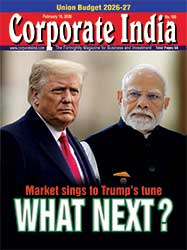Want to Subscribe?
Read Corporate India and add to your Business Intelligence

![]() Unlock Unlimited Access
Unlock Unlimited Access

News
Published: September 12, 2023
Updated: September 12, 2023
The G20 Summit held in New Delhi recently addressed a myriad of critical global issues, including digital infrastructure, gender equality, and financial sector reforms. However, the focus on tax reforms and the crypto industry grabbed the world's attention. In this article, we will delve into the key decisions made during the summit and their implications for global taxation and financial transparency.
The G20 leaders unanimously reaffirmed their commitment to the swift implementation of the 'Two-Pillar' international tax package. 'Pillar One' seeks to allocate a portion of taxing rights to market jurisdictions rather than residential ones. For instance, India will now have the authority to impose income tax on sales generated within its borders by giant e-commerce platforms like Amazon, Google, Facebook, and ChatGPT. This shift addresses the issue of these companies claiming non-applicability of Indian tax laws due to the absence of a permanent establishment. Notably, unilateral measures like equalization levies will be withdrawn after 'Pillar One' comes into effect.
Under 'Pillar Two,' a global minimum corporate tax rate of 15% will be imposed on major multinational corporations (MNCs). This means that MNCs, such as Apple, Amazon, Google, and Facebook, operating through complex networks of subsidiaries in low-tax jurisdictions, will need to pay a top-up tax to bridge the gap between the global minimum tax rate and the tax rate in the low-tax jurisdiction. This measure aims to curb tax avoidance strategies used by these corporations.
One of the standout highlights of the G20 joint declaration is the call for the swift implementation of the Crypto-Asset Reporting Framework (CARF). Developed in response to the rapid growth of the crypto-asset market, CARF standardises the reporting of tax information on crypto transactions. This will enable automatic exchange of such information between jurisdictions of taxpayer residence, making it nearly impossible to conceal crypto transactions. Indians using foreign-domiciled crypto exchanges will now be subject to this transparency protocol.
The G20 also acknowledged the OECD's report on improving international tax transparency
in real estate transactions and the Global Forum Report on facilitating the use of tax treaty-
exchanged information for non-tax purposes. Confidentiality laws in tax havens and low-tax
jurisdictions often hinder Indian tax authorities. However, following a request from India's
G20 presidency, efforts are underway to streamline the broader use of treaty-exchanged
information among interested jurisdictions.
The G20 Summit of 2023, hosted by India, has set a new course for global taxation and
financial transparency. With the implementation of the 'Two-Pillar' tax package, the
imposition of a global minimum corporate tax rate, and the adoption of the Crypto-Asset
Reporting Framework, individuals and corporations alike will face heightened scrutiny. Non-
disclosure of crypto transactions, foreign bank accounts, or overseas real estate holdings to
Indian tax authorities may lead to significant regulatory fines and penalties in the post-G20
era. These historic decisions mark a pivotal moment in the evolving landscape of
international finance and taxation.

February 15, 2026 - First Issue

Industry Review

Want to Subscribe?
Read Corporate India and add to your Business Intelligence

![]() Unlock Unlimited Access
Unlock Unlimited Access
Lighter Vein

Popular Stories
Archives
